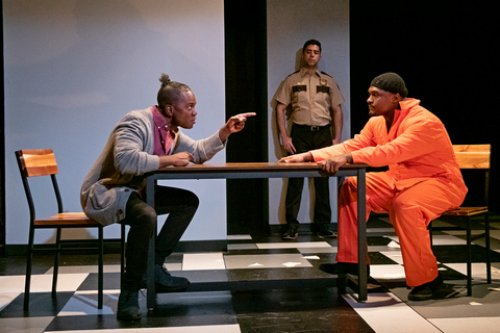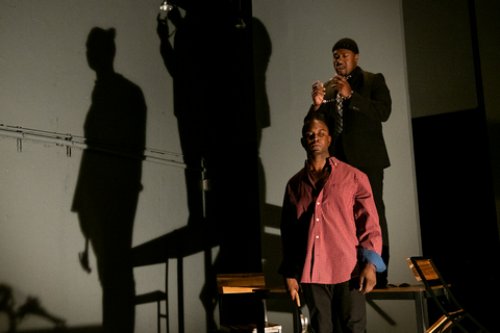Bars and Measures
Focused on two musically talented brothers with vastly different world views, this thoughtful play asks at what point personal convictions trump family ties.

Roderick Lawrence, Abraham Makany and Shabazz Green in a scene from Idris Goodwin’s “Bars and Measures” at Urban Stages (Photo credit: Russ Rowland)
[avatar user=”Mark Dundas Wood” size=”96″ align=”left” ] Mark Dundas Wood, Critic[/avatar]
From Jamie and Edmund in Eugene O’Neill’s Long Day’s Journey into Night to Lee and Austin in Sam Shepard’s True West, uneasy bonds between brothers have provided memorable scenarios in American theater. Now we can add a new entry to the category with Idris Goodwin’s Bars and Measures, directed by Kristan Seemel at Urban Stages. Set in the worlds of classical music and jazz, the play is a tale of a pair of siblings whose ways of viewing the world are so disparate that their blood tie may not be enough to keep them united. The story is based loosely on real-life events.
Bilal (Shabazz Green) is a jazz bassist of some renown, as well as a martial arts instructor. Born into a Christian family and given the name Darryl, he has converted to Islam for political reasons. At the top of the play, he is being held in jail, facing trial on a charge of aiding Islamist terrorists. Whether or not he is innocent is unclear—he was arrested as part of a sort of sting operation.
Then there’s his younger brother, Eric (Roderick Lawrence). Eric shares Bilal’s love of jazz, but his own career has been in the world of classical music. He never made the move to Islam, and—as we eventually learn—he has a deep (if sometimes hidden) loathing of radicalized Islamists. Still, he loves his brother.
We first see the two of them in a visiting room in the jail, where they practice a jazz composition by scatting the melody. We soon learn—in part through flashbacks— of the growing tension between the two, as Bilal disparages his little brother’s preference for classical music and for his refusal to see Islam as the logical cultural and political path for a young man of color in the 21st century. The conflict for Eric is complicated when he begins dating a Muslim woman named Sylvia (Salma Shaw), a classical singer with an interest in jazz. Sylvia soon assists Eric in raising funds to help defend Bilal in court.

Salma Shaw and Roderick Lawrence in a scene from Idris Goodwin’s “Bars and Measures” at Urban Stages (Photo credit: Russ Rowland)
The play’s dynamic—with the two brothers trying to stay in sync even as they find themselves polar opposites in nearly all areas of their lives—seems at points to make the play a kind of clunky “what if” scenario from a modern-problems textbook (the punny title doesn’t help). However, Goodwin’s talent for writing smart, occasionally amusing dialogue and for making his characters seem like real people rather than emblems largely mitigates that concern. Also, the work of the actors in this production is quite strong.
Eric is really the center of the play, and the likable Lawrence makes the character’s inner conflicts real. In a monologue early in the script, he is wise to confide in the audience, rather than declaim to them. He is also effective in a beautifully directed scene with the excellent Shaw, in which we see Eric and Sylvia’s musical collaboration morph into a sexy interaction.
Green is fine as Bilal, though perhaps the character should be even more dominating and formidable than we see him here. We don’t exactly disbelieve that, as a martial artist, his Bilal could kill with his bare hands, but that’s something we shouldn’t have any doubts about.
Rounding out the cast is Abraham Makany who appears in multiple roles, most notably as Wes, an officer at the jail where Bilal is being held. He speaks little as this character but is a vital presence. In addition to portraying Sylvia, Shaw also plays some supporting roles, and she makes each of them a distinct presence.
Lawrence, Green and Shaw also bring considerable musical talents to the production, which adds to its overall success. The original music by Justin Ellington adds to the ambience, but the decision to have it playing over the spoken lines during a trial sequence may not have been the best choice. We need to hear all that’s said in this scene.

Roderick Lawrence and Shabazz Green in a scene from Idris Goodwin’s “Bars and Measures” at Urban Stages (Photo credit: Russ Rowland)
Scenic designer Frank Oliva has fashioned a unit set with a checkerboard-like black-white-and-gray floor. John Salutz’s lighting helps to isolate certain areas of the stage. This is important to the script, which calls at times for actions in different settings to be seen simultaneously. The costumes by Sarah Lawrence include outfits that look just like what accomplished young musical artists in an urban setting would wear. The most memorable is a chic ensemble for Sylvia that helps to depict her as a fairly secular Muslim woman with obvious clotheshorse tendencies.
To a large degree, Bars and Measures is a play of ideas. It is not necessarily the kind of play that puts you through an emotional wringer. But it may make you think about your allegiance to members of your own family and to consider at what point blood may no longer seem thicker than water.
Bars and Measures (extended through November 17, 2019)
Urban Stages, 259 West 30th Street, in Manhattan
For tickets, call 866-811-4111 or visit http://www.urbanstages.org
Running time: 100 minutes with no intermission






Leave a comment